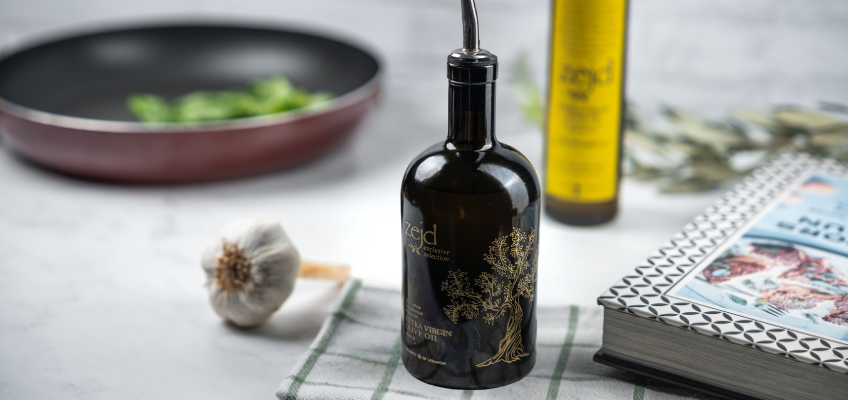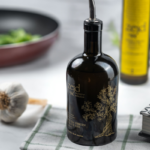Reducing kitchen waste is one of the simplest and most effective steps toward a more sustainable lifestyle. While cutting down on plastic and food scraps is a common focus, one often-overlooked secret weapon can make a big difference—for both your home and the planet: olive oil. In cooking and beyond, this versatile kitchen staple helps minimize waste in surprising ways. Here are some easy yet impactful ways to make your kitchen more eco-friendly with olive oil.
- Cook More, Waste Less
Using olive oil strategically in cooking can help prevent food waste:
- Optimize Oil Usage: Use a pour spout to control how much olive oil you’re using. This can help reduce waste from over-pouring and ensure that every drop of olive oil is used efficiently.
- Reuse Cooking Oil: If you’ve used olive oil for frying or sautéing, reuse it for cooking similar ingredients. Simply strain and store it in a separate container to use in future cooking.
- Make Homemade Dressings: Instead of buying bottled salad dressings (which often come in plastic), make your own using olive oil, vinegar, and spices.
- Stretch Meals: Add olive oil to sauces, soups, or stews to enhance flavor and extend portions, making leftovers more appetizing and reducing the likelihood of throwing out food.
- Roast Leftover Skins or Peels: When preparing vegetables or fruits with skins, like potatoes or apples, save peels and scraps, toss them with olive oil and seasoning, and roast them for a tasty, crunchy, nutritious snack.
- Extend the Shelf Life of Food
One of the biggest contributors to kitchen waste is food spoilage. Olive oil can help extend the freshness of certain foods, reducing the need to throw them away.
- Preserve Fresh Herbs: Chop surplus fresh herbs like basil, rosemary, or thyme, submerge them in olive oil, and freeze them in ice cube trays. This prevents waste and makes it easy to add herbs to future dishes.
- Keep Cheese Fresh: Coat hard cheeses like Parmesan with a thin layer of olive oil before storing them in the fridge to prevent mold and drying out.
- Prevent Food Browning: Drizzle olive oil over cut fruits and vegetables (like avocados, apples, or potatoes) to prevent browning, slow down oxidation, and extend freshness, reducing food waste.
- Preserve Homemade Sauces: Drizzle olive oil on top of homemade sauces, like tomato sauce, to create a seal. This helps preserve the freshness of the sauce for a longer time, preventing waste due to spoilage.
- Revive Stale Bread: Brush old bread with olive oil and bake it in the oven to revitalize it. This transforms leftover bread into crispy, flavorful pieces of crostini or croutons reducing waste.
- Make Your Own Reusable Kitchen Products
Many disposable kitchen items can be replaced with homemade, reusable alternatives using olive oil:
- Make DIY Natural Wood Polish: Instead of using chemical-laden polish, mix olive oil with a bit of lemon juice and use it to clean and shine wooden cutting boards, utensils, and countertops.
- Enhance Reusable Food Wraps: If you make your own beeswax wraps, adding a small amount of olive oil makes them more flexible and long-lasting, reducing the need for plastic wrap.
- Condition Cast Iron Cookware: Instead of buying expensive conditioners, rub a thin layer of olive oil onto your cast iron skillet to prevent rust and keep it in top shape.
- Repurpose Olive Oil for Cleaning
Rather than relying on store-bought cleaners in plastic bottles, olive oil can be used as a natural, waste-free alternative:
- Remove Sticky Labels: Rub olive oil onto stubborn labels and let it sit for a few minutes before peeling them off easily.
- Polish Stainless Steel: Apply a small amount of olive oil to a cloth and buff stainless steel appliances to remove fingerprints and smudges.
- Clean Measuring Cups and Spoons: Before measuring sticky ingredients like honey or syrup, rub a bit of olive oil on the utensils to make them easier to clean.
- Buy Olive Oil Sustainably
The way you buy olive oil can also help reduce waste:
- Choose Larger Containers: Buying olive oil in bulk or larger bottles reduces the amount of packaging waste over time.
- Refill When Possible: Some grocery stores and specialty shops offer refill stations for olive oil, allowing you to reuse bottles instead of buying new ones.
- Repurpose Empty Bottles: Once an olive oil bottle is empty, wash it thoroughly and reuse it as a container for homemade dressings, sauces, or other oils/liquids, or even as a vase or a decorative piece. This reduces the need for purchasing more bottles.
- Source Wisely: Choosing high-quality, sustainably produced olive oil supports better agricultural practices and lower environmental impact.
Small, thoughtful changes in how you use olive oil can significantly reduce waste in your kitchen. From preserving food and replacing disposable items to natural cleaning and sustainable shopping, olive oil is a powerful tool for a more eco-friendly living. By making mindful choices, you can enjoy delicious meals while reducing your environmental footprint—one drop of olive oil at a time. For an even greater impact, consider turning to sustainable brands like Zejd, and don’t miss out on the House of Zejd Filling Station, for a refillable, zero-waste experience!







Leave a Reply